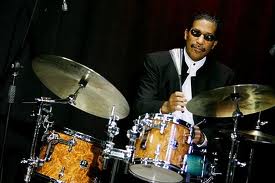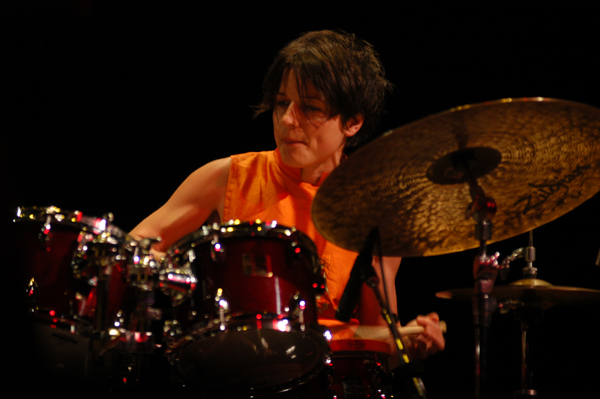Old friend Steve Schwartz, the former and much-lamented long time jazz radio show host at Boston’s WGBH who was axed during that station’s draconian program grid change last year, sent me a very provocative recent article. In the February 10-12 weekend edition of Counterpunch pianist-composer George Duke contributed a piece with the intriguing heading: “Has Jazz Lost Its African-American Core?” You can find that piece in its entirety at the following link: http://www.counterpunch.org/2007/02/10/has-jazz-lost-its-african-american-core/.
 Some of Duke’s key points, excerpted here, include the following:
Some of Duke’s key points, excerpted here, include the following:
“I’ve noticed a marked change of direction in many young jazz pianists. There seems to be a moving away from swing and spontaneous improvisation… it is a musical movement of players leaning towards European elements and not traditional African American elements. The feeling of the blues has been diminished… these young players in reality sound more like classical players… somewhere in a performance one needs to acknowledge it’s heritage either directly or indirectly. I have to look hard to find that free expression of emotion, living on a tight rope, experimenting, trying difficult passages and maybe not totally executing it correctly but making the attempt… when technique becomes more important than telling a musical story or surfing the wave of spontaneous thought, then I believe it is a misguided quest. Technique is and always will be a means to an end and not an end in itself! I’m just making an observation and wondering why? …Why the move away from traditional African American musical values? …I’ve heard some of these players play the blues, and its quite apparent that they don’t have a clue how to do it. The blues is a feeling and attitude… so when young players abandon that, it’s almost like they are abandoning a large part of what I love about jazz. The blues at it’s best is raw and free, and mad technical expertise has little to do with it! …I don’t believe one necessarily needs to personally experience the American black scenario in order to enjoy, understand or play the blues! One just needs the interest, gift and effort put forth to learn what makes it work. …I’m feeling a historical disconnect between these new crop of young players and their predecessors. What makes and made jazz was the combination of African American and European elements. To me the music works best when it contains both. So in the end whether these young players are really playing jazz based on this definition is debatable. Whether they are good players is undeniable. Whether it matters is also a point for discussion. And I’m not trying to control jazz, the mere idea is a ridiculous notion. Jazz was born of a free mind and hopefully will remain that way! …there is too much music being made today that is contrived and totally controlled. As I said before, style of music is irrelevant! The important message is the freedom of creativity and thought. Building on what came before and taking that idea to new levels.”
— George Duke/Counterpunch 2/10-12/13 http://www.counterpunch.org/2007/02/10/has-jazz-lost-its-african-american-core/
Read the entire piece, it is quite provocative and reflective of conversations in which many of us have participated in recent years, along with various discussions on how musicians learn this music today largely in the academy. I immediately circulated George Duke’s Counterpunch piece particularly to my fellow board members from the Jazz Education Network (JEN), as well as other musicians and educators who have engaged in similar conversations. Here are excerpts from a series of very thoughtful responses to the issues raised in Duke’s piece, coming largely from musician-educators, full-time educators, several full-time musicians who have engaged in various related public debates that have raged across the internet via blogs, Facebook, and Twitter, and one enthusiast. These appear in the order in which they were received. What’s your take? Leave your comments and personal reflections below.

“I feel currently there are many students and young musicians who have technical skills beyond the scope of many musicians from decades past. However I find myself being drawn to people who play from the heart, notwithstanding their technical accomplishments. Bird and Dizzy had amazing technical skill and coupled with their depth they were amazing. Miles and Chet Baker had far less technique but speak to me in a way few other artists can.”
— Bob Sinicrope, bassist-educator (Milton Academy – MA) JEN President-elect

“We still live in segregated communities, attend segregated churches and as a nation are trending towards exclusivity-based school systems (aka magnet and charter schools). Jazz in many ways represents the 1% and not the masses. In this way alone comes the loss of roots and spirituality. Jazz is now a commodity sold like bread and cheese.”
— Bob Belden, saxophonist-composer-bandleader-producer

“I do have to take issue about a blanket statement that blames “the Academy” for the problem. The problem is individuals themselves, not the academy. The individuals have to care about what they do and deliver it with ‘integrity’. Teachers as well, have to deliver with integrity in their teachings, and teach the ‘passion, drive determination, and dedication’ it takes to be successful as a performer. I would concede and agree that performers and students need more outlets to ‘mentor’ and ‘be mentored’ and feel that we at JEN are working towards supporting the academy in the teaching of music beyond their hallowed walls.” [Investigate the new JEN Mentor Program Lou refers to at www.jazzednet.org]
— Lou Fischer, bassist-composer-educator; past JEN President, Capital University (OH)

“I have always known and respected [George Duke’s] musicianship and his wonderful playing, but I do not know him personally. George Duke sounded off quite eloquently, in my opinion. The subject is quite valid and certainly needs to be aired and will be by many, I’m sure. In essence, the fun, the joyful spontaneity, the passion, and that infectious GROOVE that occurs on the bandstand that makes the body warm, is what is being lost and/or rejected as not being relevant these days. All I can say is those particular musicins are missing the very essence of the music, that is HUGE.”
— Rufus Reid, bassist-composer; JEN 2013 Honoree (www.rufusreid.com)

“I agree with Rufus, as well. Been saying it for a while and wish more cats would speak up.”
— Nicholas Payton, trumpeter-keyboardist-vocalist-composer; principle exponent of #BAM (Black American Music)

“Many of the more “current” pianists are some of my favorites – Brad Mehldau, Geoffrey Keezer, Robert Glasper, etc. I don’t hear any lack of spontaneity from these guys, but maybe I’m missing something. I do feel like as a genre the music is drifting away from the blues, which I would always prefer to [hear] more of. I have very strong feelings about the lack of connection between jazz artists and their audiences. Any time a musician pulls a blues out of their bag, the audience becomes engaged, so I am definitely in favor of seeing more of that. I do hear fairly often that it it doesn’t swing it isn’t jazz. I would definitely take issue with that point. To me, jazz is any music that is spontaneous and requires in-the-moment communication.”
— Caleb Chapman, saxophonist-educator; Caleb Chapman Music (www.calebchapmanmusic.com)

“I’m missing one important element of jazz from the discussion, which is jazz as an improvisatory storytelling of musicians by listening and responding to each other and of course communicating with the audience. The best and most honest stories are usually the ones told from first-hand experience rather than retelling someone else’s stories. …The story should be based on history and traditions, but also include the musicians’ personal experiences and identity. Sometimes I wonder if we forget to listen to the stories of our next generation when we complain about them abandoning traditions – there is lots of blues and swing, just reworked into today’s sorrows and hip hop, often in quite interesting ways. So is jazz losing its way? I’d say it’s just finding its new way and our responsibility is to provide the bridges needed by listening to the new stories and helping to connect them to our and previous stories. How many traditional jazz musicians do you need to screw in a light bulb? One to put it in and nine to bitch about the electricity.”
— Monika Herzig, pianist-composer-educator-author (“David Baker: A legacy in music”) (www.monikaherzig.com)

“…At this point I play Orrin Evans music! It will always be black.” (via Twitter @peeano88)
— Orrin Evans, pianist-composer-bandleader (www.orrinevansmusic.com)

“We all have stories to tell and we all tell them our way, no matter the influences. Even when HEAVILY influenced by someone, when we “speak,” the world hears “our” voice. To be honest, understanding the process the way I do, I never discourage a student from “sounding” like someone else. In fact, I encourage them to put their shoes in the feet of the music that touches them. Their individuality will at some point rise to the surface – and this happens differently and at different times to each person. One really cannot force it, nor will you notice when you have it. You don’t wake up on a Tuesday morning and declare, “Hey! I’ve finally got MY voice!” Other people notice your voice, just like other people stylistically categorize what you do. …I guess the sermon I preach the most (and I should probably apologize to my son for having to listen to it so many damn times!) is focus on expressing yourself with honesty and at the highest level you possibly can.”
— John Clayton, bassist-composer-bandleader-educator (USC) and proud father of emerging pianist Gerald Clayton (www.johnclaytonjazz.com)

“Of course [George Duke] is right – this is not rocket science. If you are going to “academize” an art form, what do we expect? Who can go to school… only those who can afford it and I don’t think most of those people have an ounce of blues in their background. And no judgment here, but how would a person from Korea know anything about the blues? (Though I must tell you the Korean students somehow swing harder than most of the Americans I have at Manhattan School of Music!!). All cultures have the “blues” somehow, but expressing that vibe is idiomatic and NOT universal. We are back to defining what jazz is… dangerous stuff!”
— NEA Jazz Master Dave Liebman, saxophonist-composer-bandleader-educator (Manhattan School of Music) (www.daveliebman.com)
“I thought Jazz was a constant, an unchangeable, consistent type of music genre that bent but didn’t break. That Jazz was unable to be penetrated by imposters, new wave pretenders, and artists responding to pop culture blowing every which way in the wind. I absolutely agree with [George] Duke on every line of his op-ed and hope that it fuels debate among those constants in the Jazz music industry. Don’t let this debate die, it is waaaaay too important.”
— David Hammons, jazz enthusiast

“Great article… and what George Duke has to say is right on the money.”
— Stephen Enos, trumpeter-educator (dir. Jazz Program, Cuyahoga Community College)

“Glad that [George Duke] is making the point because we’ve all been having this conversation.”
— Nasar Abadey, drummer-composer-bandleader-educator (Peabody Conservatory)

“I really like this piece. He makes some very valid points in a gentle manner. I was just listening to George Duke play with Sonny Rollins in Japan in the 70s. He sounds great!”
— Ethan Iverson, pianist-composer
WHAT’S YOUR TAKE? LEAVE YOUR COMMENTS BELOW…



























